NW marine mammal deaths linked to land mammal parasites
This study has rather disturbing implications since control of marine mammals’ exposure to foreign parasites due to storm runoff is essentially impossible to control on a large scale. It is truly the responsibility of each individual to control what materials and chemicals he or she allows in the soil/sidewalk/sewer and street drains that end up in our marine waters. As researcher Dr. Michael Grigg says in the report, “Identifying the threads that connect these parasites from wild and domestic land animals to marine mammals helps us to see ways that those threads might be cut by, for example, managing feral cat and opossum populations, reducing run-off from urban areas near the coast...and controlling erosion to prevent parasites from entering the marine food chain.” Additionally, domestic cat feces deposited in house toilets ultimately wind up in marine waters. It is obvious that there are many challenges in managing this dangerous situation.
Dyanna Lambourn, WDFW marine mammal research biologist (and SS mentor), and Jessie Huggins of Cascadia Research co-authored the study with Dr. Grigg and other esteemed researchers. Read the complete study here.
Read the National Institute of Allergy and Infectious Diseases news release here. Read the related Associated Press article here.
SS zoologist Buzz Shaw blog a fantastic resource
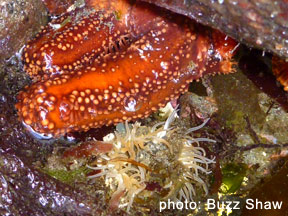
Seal Sitters in Summer Streets event today
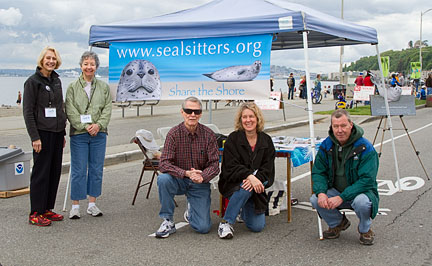
Beach cleanup a success
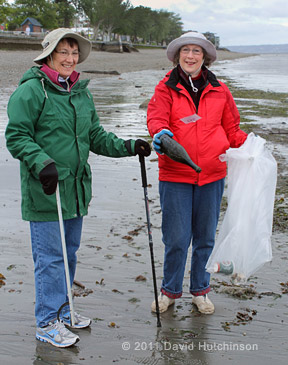
We want to thank Pioneer Coffee, Tully’s, and Starbucks for their donation of coffee to get our volunteers off to a good start. Thanks to Kristin for taking time out of her busy schedule to educate everyone and also to Larry Carpenter, of both the ACC and Seal Sitters, for coordinating this event with Parks. The Council hopes to coordinate with Seattle Parks & Recreation, local businesses, and community members in an effort to minimize the problem of litter on Alki this coming summer season. If you want additional information on how you can continue to be involved, please contact Larry at 206-938-0887.
Lend a hand for beach cleanup and save marine life
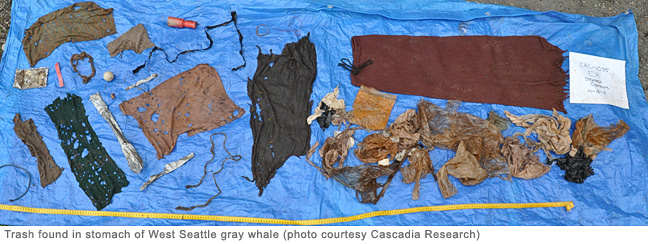
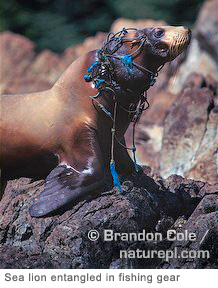
NOAA has produced several children’s activity booklets about marine debris that are available here for download: Protect the Ocean and Understanding Marine Debris. Both contain puzzles and illustrations that help kids understand the importance of keeping the beaches and marine waters free of trash - so that sea life will be here for many generations to come!
Thanks to the Americorps (Washington Reading Corps of South King County) volunteers who will be participating in the beach cleanup as well as members of ACC and Seal Sitters. This event is open to the public and all those interested in making a difference for the environment. If you, your group, or class would like to lend a hand, meet us at the Statue of Liberty across from Starbucks (Alki Ave SW near 61st) at 9am. If you have questions, please contact Larry Carpenter @ 206-938-0887. Special thanks to Carol Baker and Colleen Hackett of Seattle Parks for providing cleanup tools. Tully’s, Starbucks and Pioneer Coffee are all generously donating coffee to keep our volunteers warm and energized throughout the morning. We hope to see you there!
Happy Mother's Day to moms of all species
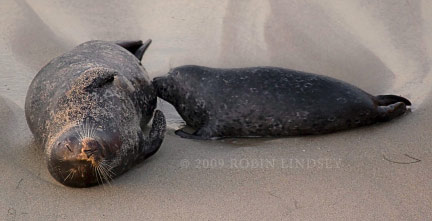
A seal mom forms a very close and affectionate bond with her pup immediately after birth and throughout the following 4-6 weeks until the pup is weaned. During this time, she teaches the pup to swim and forage for food - all the necessary skills for the pup to try to survive on his own. In this photo, a mom nurses her pup in the waning light of evening in a southern California rookery.
School kids raise funds to protect seal pups
Seal Sitters TV segment nominated for local emmy
The video can be viewed on City Stream’s website. The episode also features a story on The Seattle Aquarium’s Beach Naturalist program and the hidden treasures revealed at low tide. The segment on Seal Sitters begins at about marker 6:25, but please watch this great program in its entirety.







